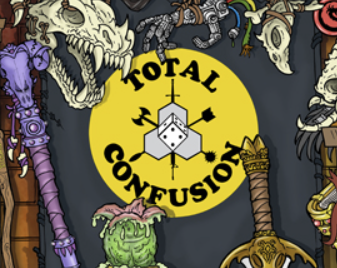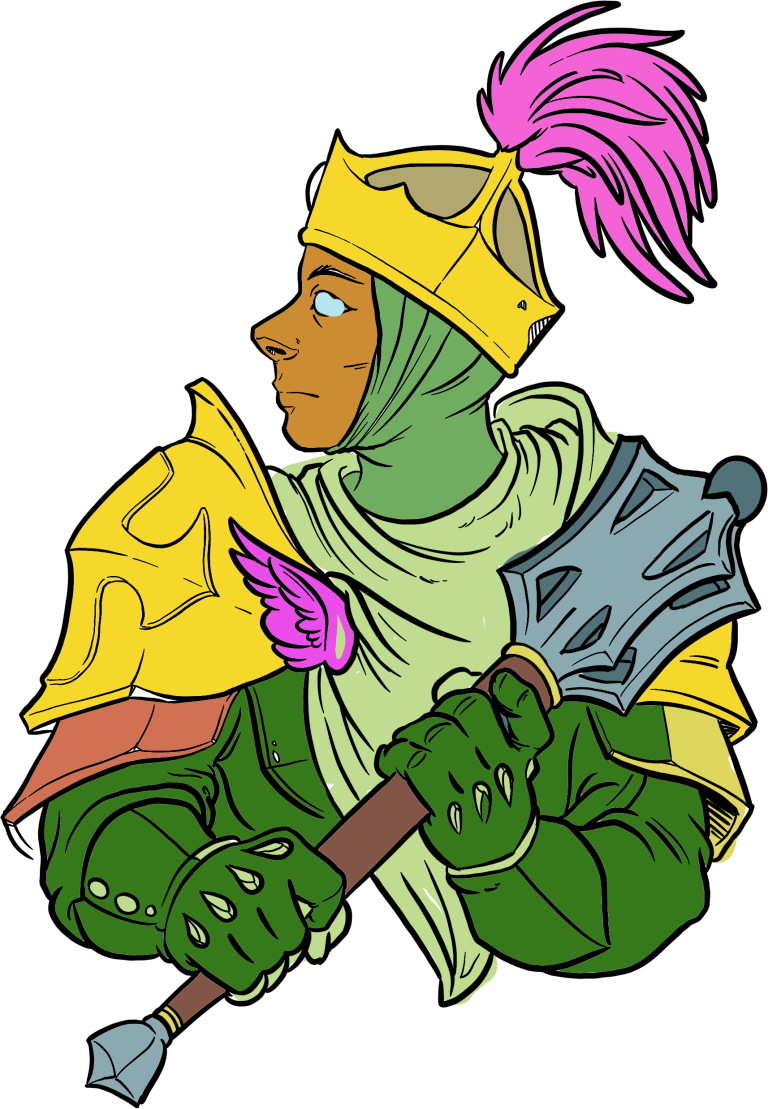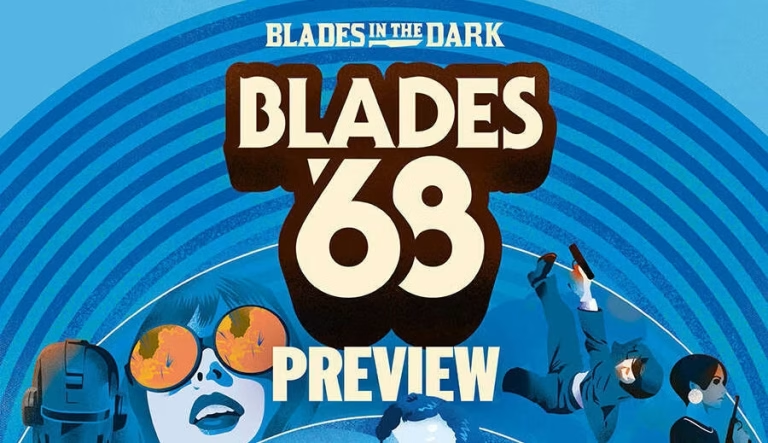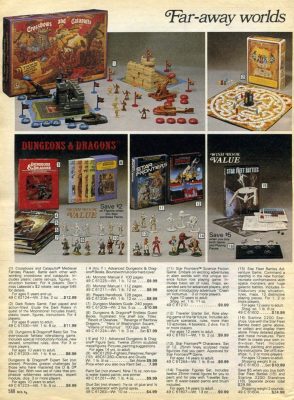NOTE: the opinions expressed in interviews are those of the guests, not necessarily those of shadomain.com.
Today we talk with Robby Howell, creator of the Enclave role playing game. You can find him at:
- Etsy shop: https://robbylavagames.etsy.com/
- Discord server: https://discord.com/invite/KSBf2dUq
- YouTube channel: https://www.youtube.com/@robbylavagames
Let’s hear from Robby!
How did you get started in ttrpgs?
I’ve been creating TTRPGs since I was 7, though I didn’t know them by that name until I was much older. It initially started as acting out video games that I saw at my friend’s houses (which my parents would not let me have), but over time it became much more substantive and original. I’d say I made my first good game when I was 14, and Enclave was in its first drafts when I was 16, two whole years before I even knew what D&D was.
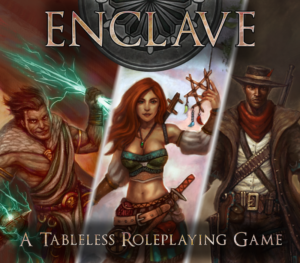
What made you decide to create your own ttrpg, and where did this inspiration for Enclave begin?
I have no idea what started it, but I love making games and have had a deep compulsion to do so for quite a long time. Enclave actually started out as an homage to Diablo 2, but has since grown and evolved to something far more. The Diablo elements are practically non-existent at this point, but a canny observer might still spot them deep within the game’s genetics!
Enclave is a diceless roleplaying game. Can you explain how that works? What’s the core of the game, and what makes it a game, in your opinion?
I’m a firm believer in games requiring a failure state, and my diceless work is no exception. Enclave, at its core, follows up pretty intuitive loop for action resolution: 90+% is common sense, and when the right call to make isn’t obvious the host asks themselves three questions:
1. How well did my player describe what they are doing? If they really did a beautiful job of selling you on it, even if baseline common sense might dictate otherwise, you give it to them.
2. What outcome tells a better story? Note that failure does not by any means necessitate a worse story.
3. If after all else you are still not sure what call to make, ask yourself how much the player in question has contributed to the session overall. Have they been trying to be in character? Have they been excited and engaged with the plot? Have they been following good etiquette? And if yes, you give them the benefit of the doubt and rule in their favor. Not only does this reward your best players who elevate the experience for everyone, but it also gives a hard incentive for everyone else involved to do so as well.
So what strengths does this system have?
1. It gives full agency to the players and the host: what happens to your characters is tangibly grounded in your decisions, which is far more satisfying and gives much more opportunity for player skill expression.
2. It is dramatically faster. Though the system outlined above might sound complicated, after just a few sessions a host can get to the point where they can make these calls in seconds, keeping up the energy and momentum of the session and reducing the need to break for rolling, checking tables, etc.
3. Enclave missions can be dramatically harder than other games – even at low levels, the lack of randomness and benefit of the doubt afforded to good players means that characters can reasonably overcome far greater odds than you might expect.
If you are curious what this looks like in action, check out the Actual Plays on our YouTube channel and join the Discord to spectate. Even if you think that diceless isn’t necessarily for you, I bet you’ll find a lot more to like than you might expect.
Had you written and published any games or adventures before working on Enclave?
I worked as a professional game host during and after college, with Enclave only being one part of my repertoire. I haven’t published any of my other works yet, but maybe someday I’ll get to share those with you too.
How long does an average session of Enclave take?
3 to 4 hours, though it can easily go higher or lower depending on group preferences. For a full, satisfying session I would recommend at least two hours.
Enclave is primarily played in one-shots, though long form is also equally doable. But the one-shot model makes scheduling dramatically easier and also allows the fluff to be cut from sessions, making them far more action-packed.
What genre does Enclave portray, and what character types are available?
Enclave is a genre-bashing game, taking place in a self-contained multiverse called Manifold where all time frames, magic levels, and genres can be explored. Characters come from backgrounds of their player’s creation, and every session takes place in an entirely novel setting unless a playgroup wishes otherwise.
There are currently six classes, eclectic but relatively familiar, which can be reskinned to fit as wide a range of themes as Manifold itself. I have substantial plans to expand Enclave, with more classes being chief among these plans. In the legacy version of Enclave that I ran for almost a decade we had over 130 classes, and I fully intend to build back towards that number.
Do you prefer being a GM or being a player in and why?
I only host. I’ve been doing it so long that it’s practically second nature by now.
I also personally prefer the term Conduit to GM or DM – I’m not a master of anything, after all!
Do you attend a lot of gaming conventions? What’s your favorite part of going to a con?
Now that I have my game formally published I’m hoping to go to more! But now that I have two small children I pretty much only do it for business rather than pleasure. I think my favorite part has to be the constant activity, gives a real hit of adrenaline. We also got dressed up at the last convention I went to, which was super fun.
What ttrpg would you like to play, but haven’t had the chance to try yet?
I really have trouble enjoying being a player. I’ve spent so much time designing and conduiting at this point that being on the other side of the equation feels very strange and uncomfortable to me.
That said, if I were to dive into someone else’s game, it would probably be one of those created by my friends. The SAGAS system would probably top that list – Dennis, Okayest DM on YouTube, is a really great guy, and I really appreciate the niche he’s trying to fill.
What advice would you give to anyone looking to create their own game?
Oh lord, where to even start? Probably “be ready to spend a lot of money”. Or, to be less cute about it, “start with what you love and figure out how to turn it into a viable product”. Seeing my games as a business rather than a passion project was an extremely hard hurdle for me to overcome, but it’s only once I did so that Enclave became something more.
Where can people find your work?
At the links above! If you want to buy, Etsy is the only place to do so as of now – I ship anywhere in the world, and PDF copies are also available.
Our Discord community is also thriving, so if you want to try the game out that is the best possible place to do so! We also host semi regular community events where anyone who doesn’t already own the game is given a loaner copy so you can try it out before you buy.
Thanks, Robby!
If you’d like to be interviewed at Shadomain, fill out this simple form and we’ll publish your answers on an upcoming Wednesday: https://shadomain.com/interview/
If you’d like customized questions about what you do, just email info@shadomain.com




